Early Childhood Education: Group Covenant and Work Plan Report
VerifiedAdded on 2022/11/24
|15
|3882
|168
Report
AI Summary
This report examines a group covenant and work plan for early childhood education, focusing on staff development within the KinderCare program. It details the staff development plan, including training, coaching, and communities of practice, designed to enhance educators' skills. The report highlights Pennsylvania's Learning Standards for Early Education, outlining their application across infant-toddler, pre-kindergarten, and kindergarten levels. It also explores the role of staff meetings in the development plan, emphasizing their importance in communication, problem-solving, and achieving objectives. The report includes an executive summary, keywords, and references, providing a comprehensive overview of the subject. The KinderCare program's approach to early childhood education is discussed, emphasizing its commitment to fostering innovation, wonder, and joy in children's learning experiences. The report also mentions the importance of community partnerships and mentor plans within the two-year staff development cycle.
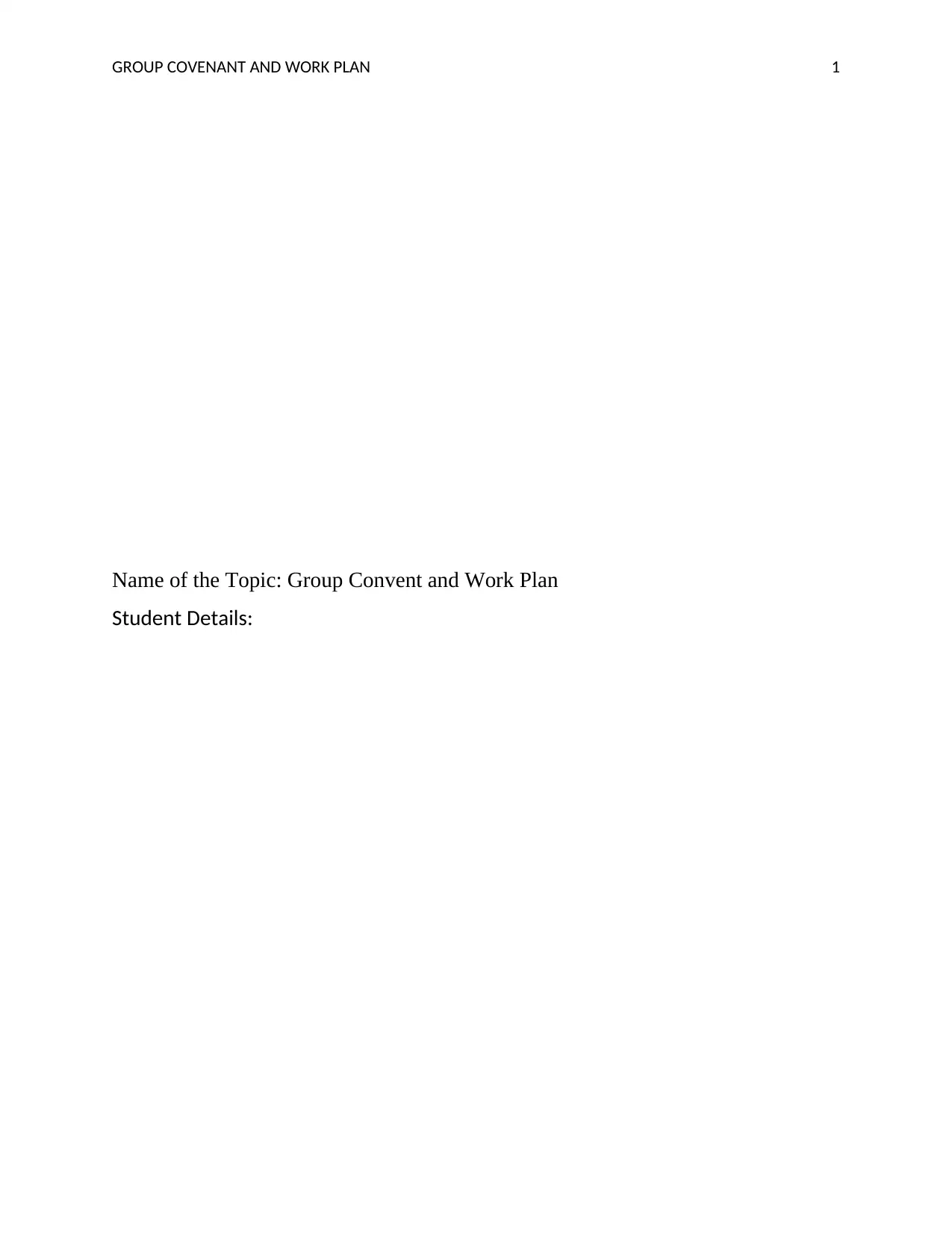
GROUP COVENANT AND WORK PLAN 1
Name of the Topic: Group Convent and Work Plan
Student Details:
Name of the Topic: Group Convent and Work Plan
Student Details:
Paraphrase This Document
Need a fresh take? Get an instant paraphrase of this document with our AI Paraphraser
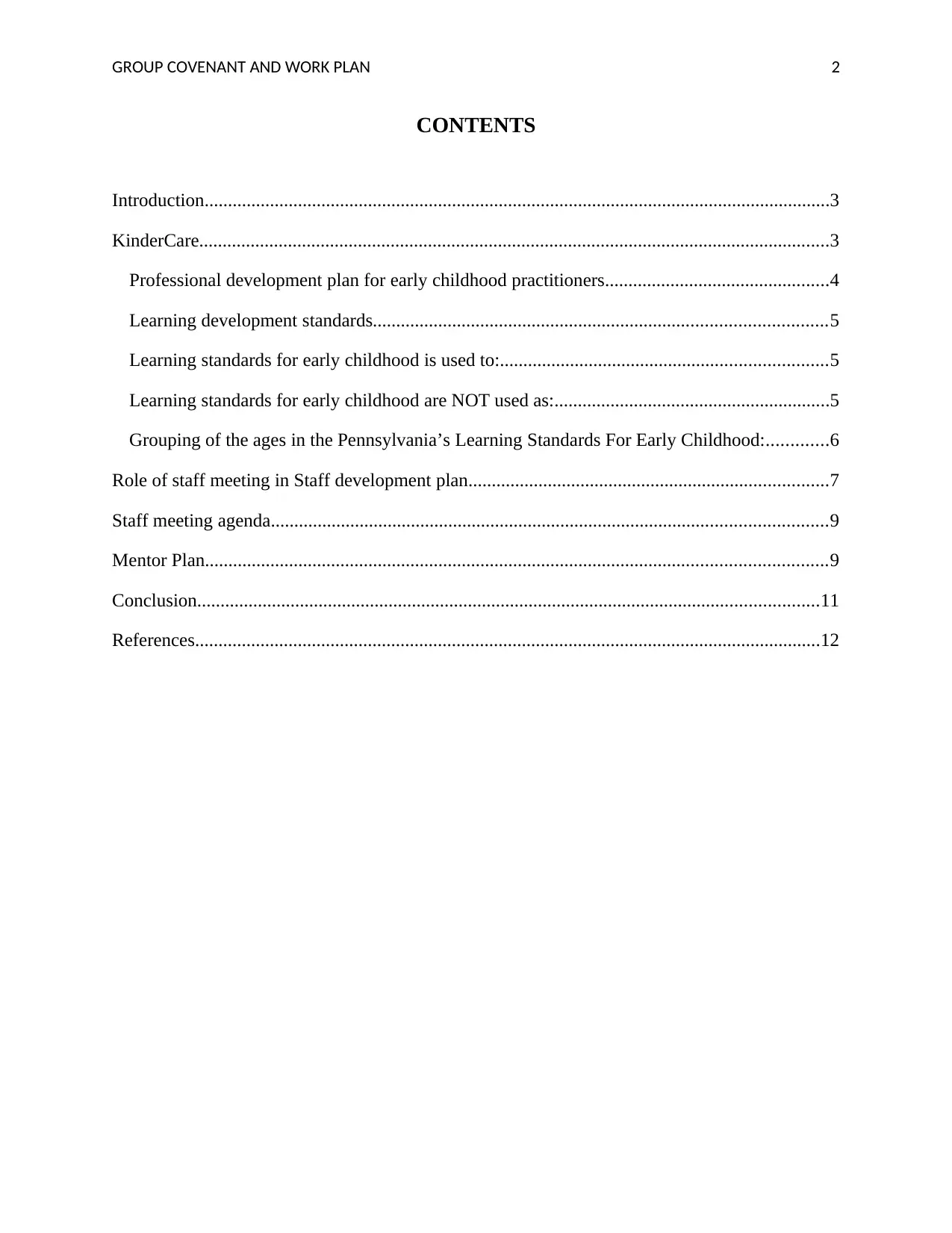
GROUP COVENANT AND WORK PLAN 2
CONTENTS
Introduction......................................................................................................................................3
KinderCare.......................................................................................................................................3
Professional development plan for early childhood practitioners................................................4
Learning development standards.................................................................................................5
Learning standards for early childhood is used to:......................................................................5
Learning standards for early childhood are NOT used as:...........................................................5
Grouping of the ages in the Pennsylvania’s Learning Standards For Early Childhood:.............6
Role of staff meeting in Staff development plan.............................................................................7
Staff meeting agenda.......................................................................................................................9
Mentor Plan.....................................................................................................................................9
Conclusion.....................................................................................................................................11
References......................................................................................................................................12
CONTENTS
Introduction......................................................................................................................................3
KinderCare.......................................................................................................................................3
Professional development plan for early childhood practitioners................................................4
Learning development standards.................................................................................................5
Learning standards for early childhood is used to:......................................................................5
Learning standards for early childhood are NOT used as:...........................................................5
Grouping of the ages in the Pennsylvania’s Learning Standards For Early Childhood:.............6
Role of staff meeting in Staff development plan.............................................................................7
Staff meeting agenda.......................................................................................................................9
Mentor Plan.....................................................................................................................................9
Conclusion.....................................................................................................................................11
References......................................................................................................................................12
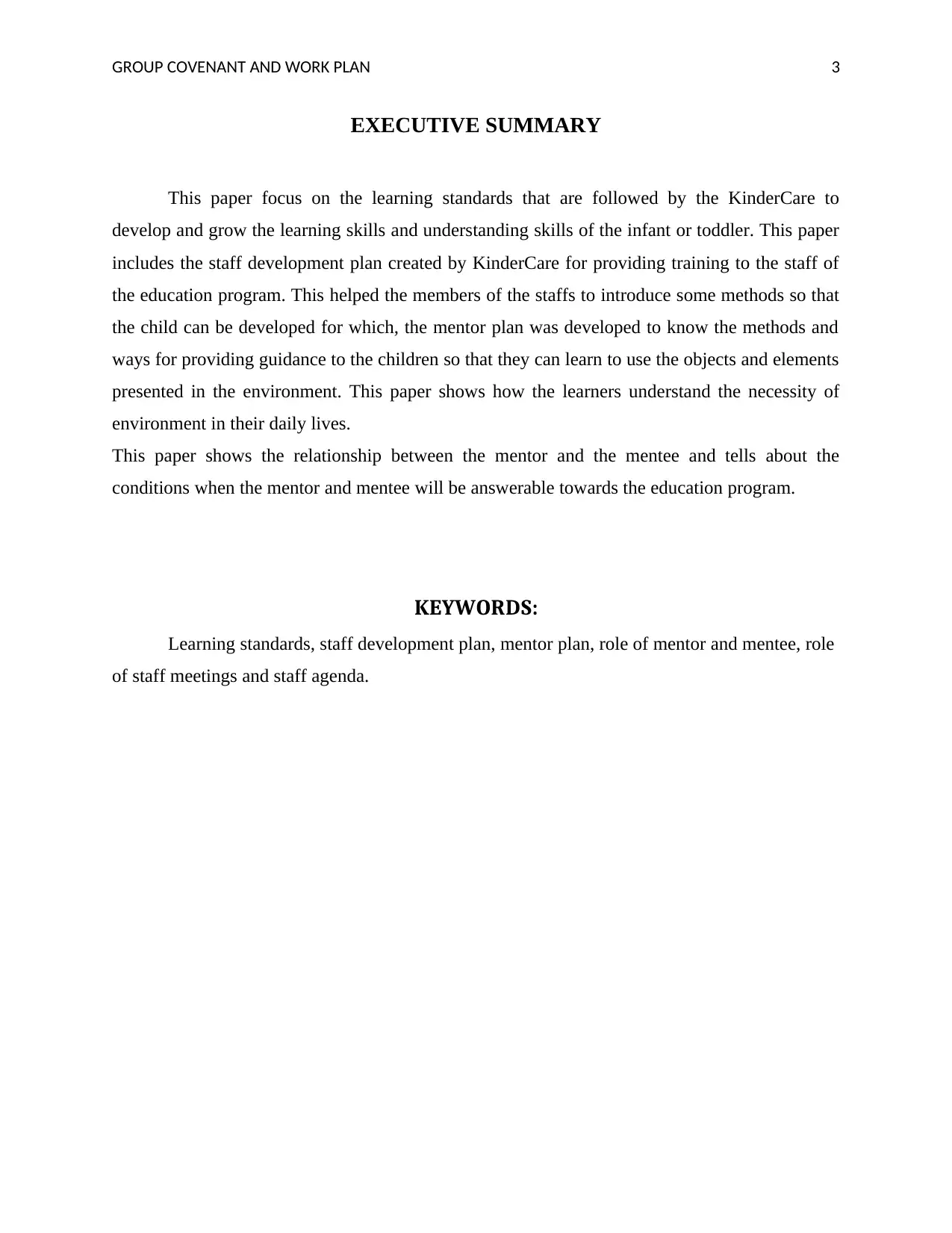
GROUP COVENANT AND WORK PLAN 3
EXECUTIVE SUMMARY
This paper focus on the learning standards that are followed by the KinderCare to
develop and grow the learning skills and understanding skills of the infant or toddler. This paper
includes the staff development plan created by KinderCare for providing training to the staff of
the education program. This helped the members of the staffs to introduce some methods so that
the child can be developed for which, the mentor plan was developed to know the methods and
ways for providing guidance to the children so that they can learn to use the objects and elements
presented in the environment. This paper shows how the learners understand the necessity of
environment in their daily lives.
This paper shows the relationship between the mentor and the mentee and tells about the
conditions when the mentor and mentee will be answerable towards the education program.
KEYWORDS:
Learning standards, staff development plan, mentor plan, role of mentor and mentee, role
of staff meetings and staff agenda.
EXECUTIVE SUMMARY
This paper focus on the learning standards that are followed by the KinderCare to
develop and grow the learning skills and understanding skills of the infant or toddler. This paper
includes the staff development plan created by KinderCare for providing training to the staff of
the education program. This helped the members of the staffs to introduce some methods so that
the child can be developed for which, the mentor plan was developed to know the methods and
ways for providing guidance to the children so that they can learn to use the objects and elements
presented in the environment. This paper shows how the learners understand the necessity of
environment in their daily lives.
This paper shows the relationship between the mentor and the mentee and tells about the
conditions when the mentor and mentee will be answerable towards the education program.
KEYWORDS:
Learning standards, staff development plan, mentor plan, role of mentor and mentee, role
of staff meetings and staff agenda.
⊘ This is a preview!⊘
Do you want full access?
Subscribe today to unlock all pages.

Trusted by 1+ million students worldwide
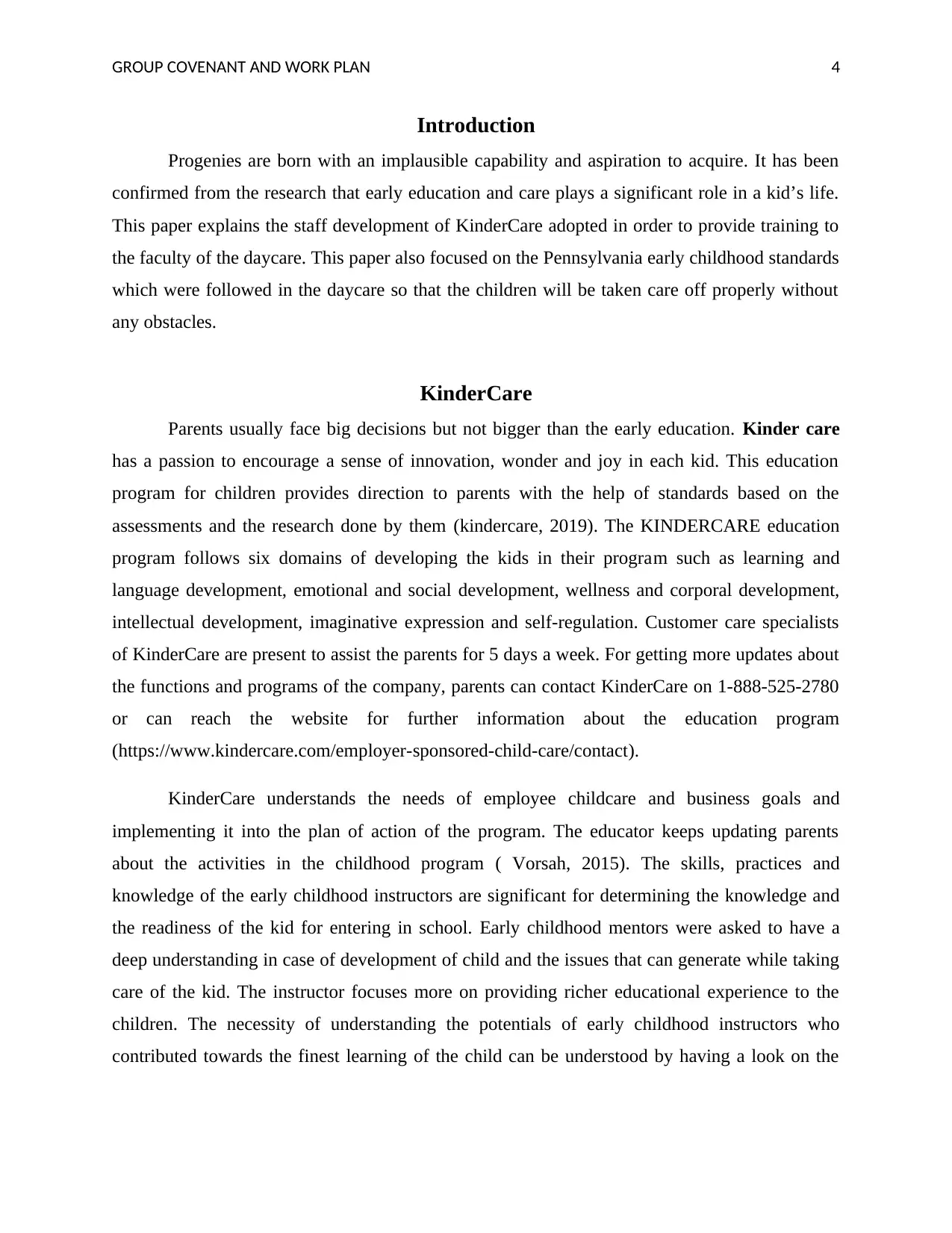
GROUP COVENANT AND WORK PLAN 4
Introduction
Progenies are born with an implausible capability and aspiration to acquire. It has been
confirmed from the research that early education and care plays a significant role in a kid’s life.
This paper explains the staff development of KinderCare adopted in order to provide training to
the faculty of the daycare. This paper also focused on the Pennsylvania early childhood standards
which were followed in the daycare so that the children will be taken care off properly without
any obstacles.
KinderCare
Parents usually face big decisions but not bigger than the early education. Kinder care
has a passion to encourage a sense of innovation, wonder and joy in each kid. This education
program for children provides direction to parents with the help of standards based on the
assessments and the research done by them (kindercare, 2019). The KINDERCARE education
program follows six domains of developing the kids in their program such as learning and
language development, emotional and social development, wellness and corporal development,
intellectual development, imaginative expression and self-regulation. Customer care specialists
of KinderCare are present to assist the parents for 5 days a week. For getting more updates about
the functions and programs of the company, parents can contact KinderCare on 1-888-525-2780
or can reach the website for further information about the education program
(https://www.kindercare.com/employer-sponsored-child-care/contact).
KinderCare understands the needs of employee childcare and business goals and
implementing it into the plan of action of the program. The educator keeps updating parents
about the activities in the childhood program ( Vorsah, 2015). The skills, practices and
knowledge of the early childhood instructors are significant for determining the knowledge and
the readiness of the kid for entering in school. Early childhood mentors were asked to have a
deep understanding in case of development of child and the issues that can generate while taking
care of the kid. The instructor focuses more on providing richer educational experience to the
children. The necessity of understanding the potentials of early childhood instructors who
contributed towards the finest learning of the child can be understood by having a look on the
Introduction
Progenies are born with an implausible capability and aspiration to acquire. It has been
confirmed from the research that early education and care plays a significant role in a kid’s life.
This paper explains the staff development of KinderCare adopted in order to provide training to
the faculty of the daycare. This paper also focused on the Pennsylvania early childhood standards
which were followed in the daycare so that the children will be taken care off properly without
any obstacles.
KinderCare
Parents usually face big decisions but not bigger than the early education. Kinder care
has a passion to encourage a sense of innovation, wonder and joy in each kid. This education
program for children provides direction to parents with the help of standards based on the
assessments and the research done by them (kindercare, 2019). The KINDERCARE education
program follows six domains of developing the kids in their program such as learning and
language development, emotional and social development, wellness and corporal development,
intellectual development, imaginative expression and self-regulation. Customer care specialists
of KinderCare are present to assist the parents for 5 days a week. For getting more updates about
the functions and programs of the company, parents can contact KinderCare on 1-888-525-2780
or can reach the website for further information about the education program
(https://www.kindercare.com/employer-sponsored-child-care/contact).
KinderCare understands the needs of employee childcare and business goals and
implementing it into the plan of action of the program. The educator keeps updating parents
about the activities in the childhood program ( Vorsah, 2015). The skills, practices and
knowledge of the early childhood instructors are significant for determining the knowledge and
the readiness of the kid for entering in school. Early childhood mentors were asked to have a
deep understanding in case of development of child and the issues that can generate while taking
care of the kid. The instructor focuses more on providing richer educational experience to the
children. The necessity of understanding the potentials of early childhood instructors who
contributed towards the finest learning of the child can be understood by having a look on the
Paraphrase This Document
Need a fresh take? Get an instant paraphrase of this document with our AI Paraphraser
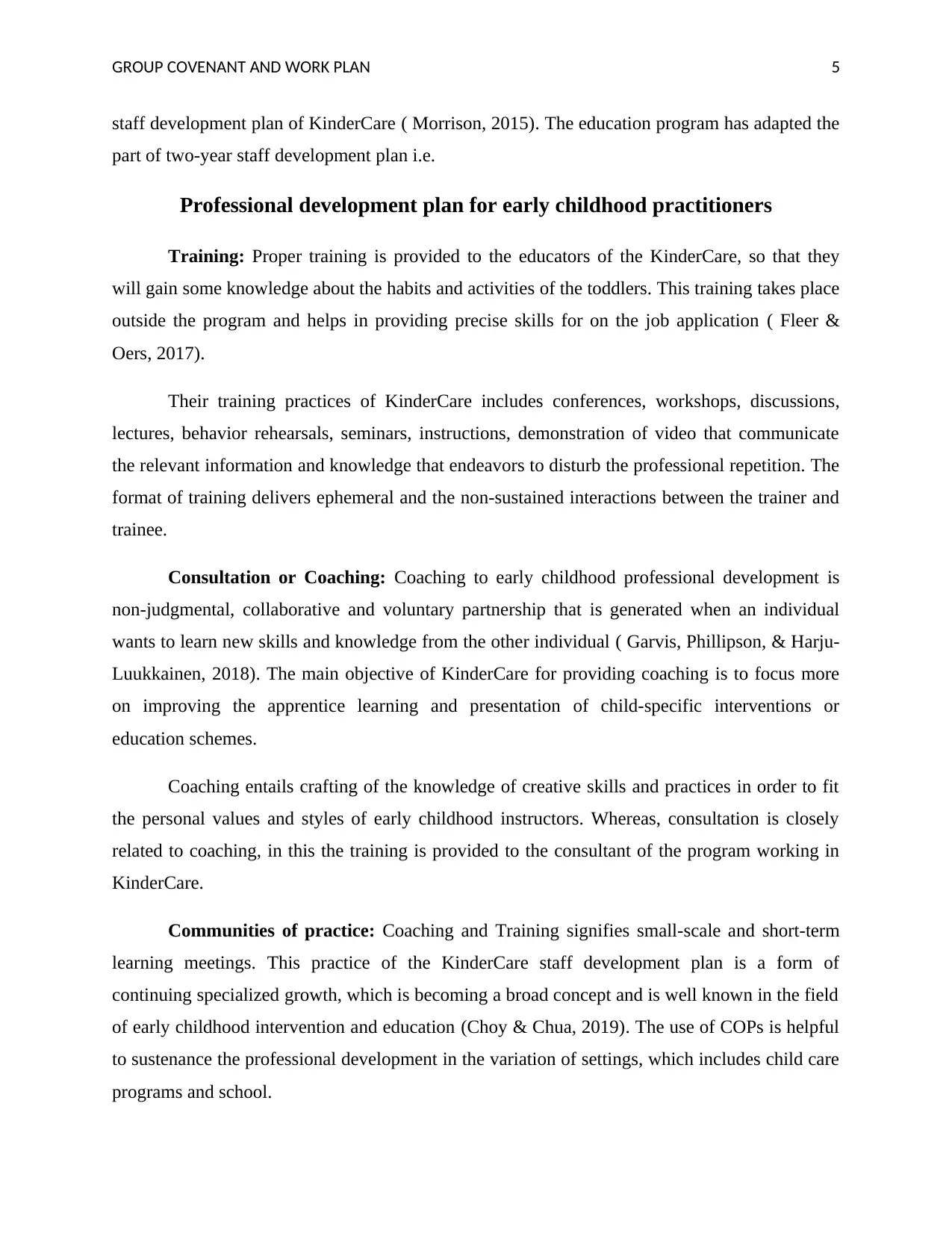
GROUP COVENANT AND WORK PLAN 5
staff development plan of KinderCare ( Morrison, 2015). The education program has adapted the
part of two-year staff development plan i.e.
Professional development plan for early childhood practitioners
Training: Proper training is provided to the educators of the KinderCare, so that they
will gain some knowledge about the habits and activities of the toddlers. This training takes place
outside the program and helps in providing precise skills for on the job application ( Fleer &
Oers, 2017).
Their training practices of KinderCare includes conferences, workshops, discussions,
lectures, behavior rehearsals, seminars, instructions, demonstration of video that communicate
the relevant information and knowledge that endeavors to disturb the professional repetition. The
format of training delivers ephemeral and the non-sustained interactions between the trainer and
trainee.
Consultation or Coaching: Coaching to early childhood professional development is
non-judgmental, collaborative and voluntary partnership that is generated when an individual
wants to learn new skills and knowledge from the other individual ( Garvis, Phillipson, & Harju-
Luukkainen, 2018). The main objective of KinderCare for providing coaching is to focus more
on improving the apprentice learning and presentation of child-specific interventions or
education schemes.
Coaching entails crafting of the knowledge of creative skills and practices in order to fit
the personal values and styles of early childhood instructors. Whereas, consultation is closely
related to coaching, in this the training is provided to the consultant of the program working in
KinderCare.
Communities of practice: Coaching and Training signifies small-scale and short-term
learning meetings. This practice of the KinderCare staff development plan is a form of
continuing specialized growth, which is becoming a broad concept and is well known in the field
of early childhood intervention and education (Choy & Chua, 2019). The use of COPs is helpful
to sustenance the professional development in the variation of settings, which includes child care
programs and school.
staff development plan of KinderCare ( Morrison, 2015). The education program has adapted the
part of two-year staff development plan i.e.
Professional development plan for early childhood practitioners
Training: Proper training is provided to the educators of the KinderCare, so that they
will gain some knowledge about the habits and activities of the toddlers. This training takes place
outside the program and helps in providing precise skills for on the job application ( Fleer &
Oers, 2017).
Their training practices of KinderCare includes conferences, workshops, discussions,
lectures, behavior rehearsals, seminars, instructions, demonstration of video that communicate
the relevant information and knowledge that endeavors to disturb the professional repetition. The
format of training delivers ephemeral and the non-sustained interactions between the trainer and
trainee.
Consultation or Coaching: Coaching to early childhood professional development is
non-judgmental, collaborative and voluntary partnership that is generated when an individual
wants to learn new skills and knowledge from the other individual ( Garvis, Phillipson, & Harju-
Luukkainen, 2018). The main objective of KinderCare for providing coaching is to focus more
on improving the apprentice learning and presentation of child-specific interventions or
education schemes.
Coaching entails crafting of the knowledge of creative skills and practices in order to fit
the personal values and styles of early childhood instructors. Whereas, consultation is closely
related to coaching, in this the training is provided to the consultant of the program working in
KinderCare.
Communities of practice: Coaching and Training signifies small-scale and short-term
learning meetings. This practice of the KinderCare staff development plan is a form of
continuing specialized growth, which is becoming a broad concept and is well known in the field
of early childhood intervention and education (Choy & Chua, 2019). The use of COPs is helpful
to sustenance the professional development in the variation of settings, which includes child care
programs and school.
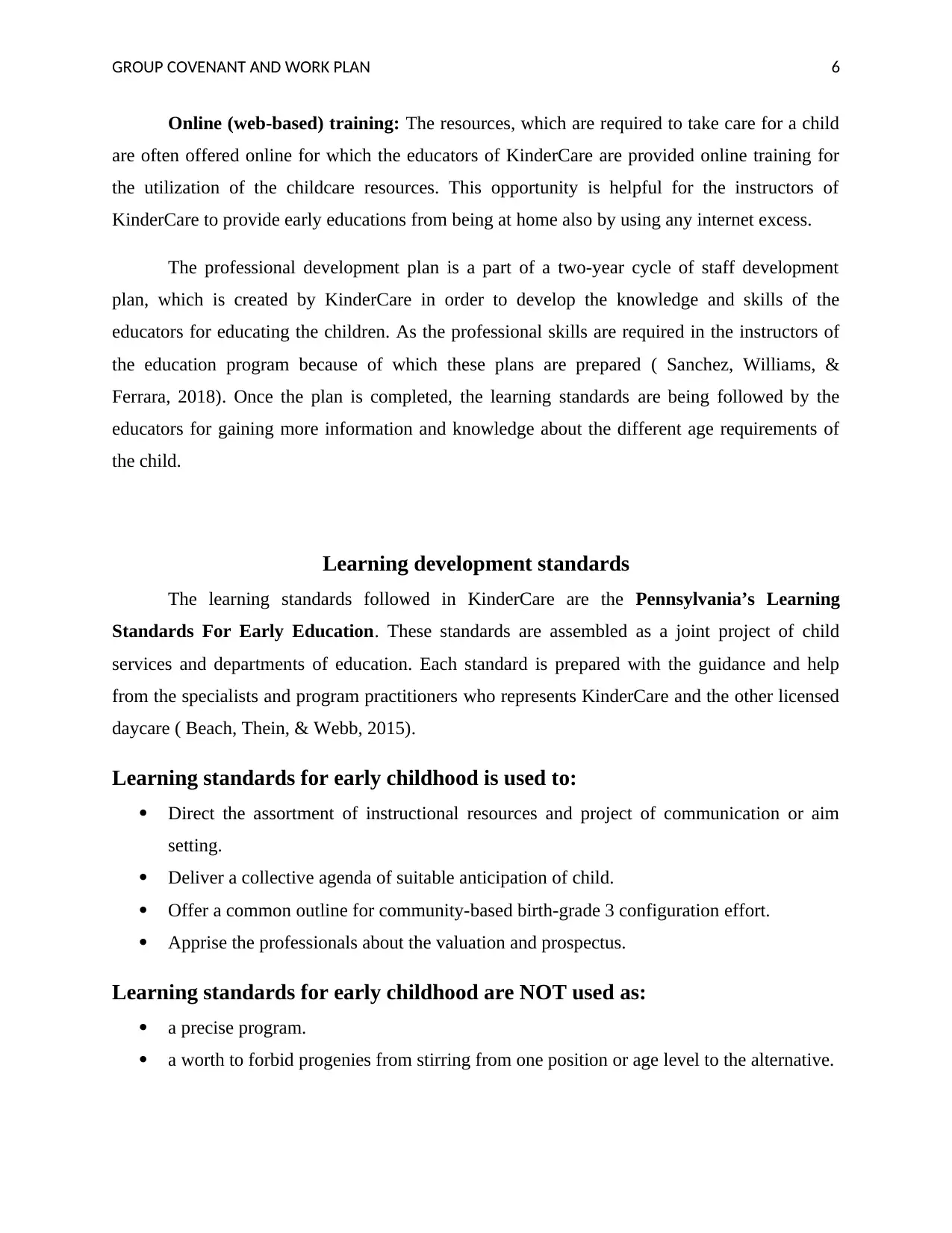
GROUP COVENANT AND WORK PLAN 6
Online (web-based) training: The resources, which are required to take care for a child
are often offered online for which the educators of KinderCare are provided online training for
the utilization of the childcare resources. This opportunity is helpful for the instructors of
KinderCare to provide early educations from being at home also by using any internet excess.
The professional development plan is a part of a two-year cycle of staff development
plan, which is created by KinderCare in order to develop the knowledge and skills of the
educators for educating the children. As the professional skills are required in the instructors of
the education program because of which these plans are prepared ( Sanchez, Williams, &
Ferrara, 2018). Once the plan is completed, the learning standards are being followed by the
educators for gaining more information and knowledge about the different age requirements of
the child.
Learning development standards
The learning standards followed in KinderCare are the Pennsylvania’s Learning
Standards For Early Education. These standards are assembled as a joint project of child
services and departments of education. Each standard is prepared with the guidance and help
from the specialists and program practitioners who represents KinderCare and the other licensed
daycare ( Beach, Thein, & Webb, 2015).
Learning standards for early childhood is used to:
Direct the assortment of instructional resources and project of communication or aim
setting.
Deliver a collective agenda of suitable anticipation of child.
Offer a common outline for community-based birth-grade 3 configuration effort.
Apprise the professionals about the valuation and prospectus.
Learning standards for early childhood are NOT used as:
a precise program.
a worth to forbid progenies from stirring from one position or age level to the alternative.
Online (web-based) training: The resources, which are required to take care for a child
are often offered online for which the educators of KinderCare are provided online training for
the utilization of the childcare resources. This opportunity is helpful for the instructors of
KinderCare to provide early educations from being at home also by using any internet excess.
The professional development plan is a part of a two-year cycle of staff development
plan, which is created by KinderCare in order to develop the knowledge and skills of the
educators for educating the children. As the professional skills are required in the instructors of
the education program because of which these plans are prepared ( Sanchez, Williams, &
Ferrara, 2018). Once the plan is completed, the learning standards are being followed by the
educators for gaining more information and knowledge about the different age requirements of
the child.
Learning development standards
The learning standards followed in KinderCare are the Pennsylvania’s Learning
Standards For Early Education. These standards are assembled as a joint project of child
services and departments of education. Each standard is prepared with the guidance and help
from the specialists and program practitioners who represents KinderCare and the other licensed
daycare ( Beach, Thein, & Webb, 2015).
Learning standards for early childhood is used to:
Direct the assortment of instructional resources and project of communication or aim
setting.
Deliver a collective agenda of suitable anticipation of child.
Offer a common outline for community-based birth-grade 3 configuration effort.
Apprise the professionals about the valuation and prospectus.
Learning standards for early childhood are NOT used as:
a precise program.
a worth to forbid progenies from stirring from one position or age level to the alternative.
⊘ This is a preview!⊘
Do you want full access?
Subscribe today to unlock all pages.

Trusted by 1+ million students worldwide
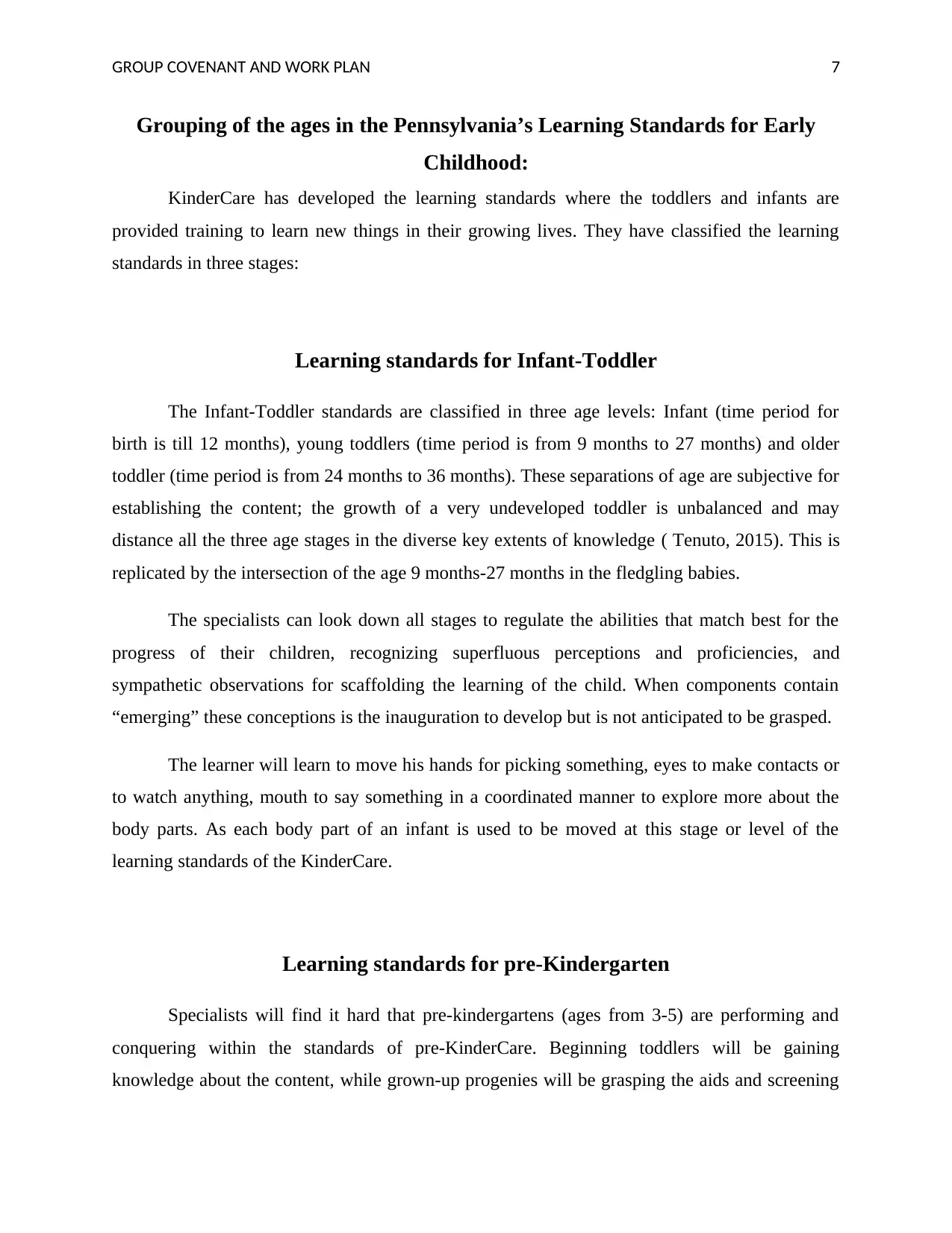
GROUP COVENANT AND WORK PLAN 7
Grouping of the ages in the Pennsylvania’s Learning Standards for Early
Childhood:
KinderCare has developed the learning standards where the toddlers and infants are
provided training to learn new things in their growing lives. They have classified the learning
standards in three stages:
Learning standards for Infant-Toddler
The Infant-Toddler standards are classified in three age levels: Infant (time period for
birth is till 12 months), young toddlers (time period is from 9 months to 27 months) and older
toddler (time period is from 24 months to 36 months). These separations of age are subjective for
establishing the content; the growth of a very undeveloped toddler is unbalanced and may
distance all the three age stages in the diverse key extents of knowledge ( Tenuto, 2015). This is
replicated by the intersection of the age 9 months-27 months in the fledgling babies.
The specialists can look down all stages to regulate the abilities that match best for the
progress of their children, recognizing superfluous perceptions and proficiencies, and
sympathetic observations for scaffolding the learning of the child. When components contain
“emerging” these conceptions is the inauguration to develop but is not anticipated to be grasped.
The learner will learn to move his hands for picking something, eyes to make contacts or
to watch anything, mouth to say something in a coordinated manner to explore more about the
body parts. As each body part of an infant is used to be moved at this stage or level of the
learning standards of the KinderCare.
Learning standards for pre-Kindergarten
Specialists will find it hard that pre-kindergartens (ages from 3-5) are performing and
conquering within the standards of pre-KinderCare. Beginning toddlers will be gaining
knowledge about the content, while grown-up progenies will be grasping the aids and screening
Grouping of the ages in the Pennsylvania’s Learning Standards for Early
Childhood:
KinderCare has developed the learning standards where the toddlers and infants are
provided training to learn new things in their growing lives. They have classified the learning
standards in three stages:
Learning standards for Infant-Toddler
The Infant-Toddler standards are classified in three age levels: Infant (time period for
birth is till 12 months), young toddlers (time period is from 9 months to 27 months) and older
toddler (time period is from 24 months to 36 months). These separations of age are subjective for
establishing the content; the growth of a very undeveloped toddler is unbalanced and may
distance all the three age stages in the diverse key extents of knowledge ( Tenuto, 2015). This is
replicated by the intersection of the age 9 months-27 months in the fledgling babies.
The specialists can look down all stages to regulate the abilities that match best for the
progress of their children, recognizing superfluous perceptions and proficiencies, and
sympathetic observations for scaffolding the learning of the child. When components contain
“emerging” these conceptions is the inauguration to develop but is not anticipated to be grasped.
The learner will learn to move his hands for picking something, eyes to make contacts or
to watch anything, mouth to say something in a coordinated manner to explore more about the
body parts. As each body part of an infant is used to be moved at this stage or level of the
learning standards of the KinderCare.
Learning standards for pre-Kindergarten
Specialists will find it hard that pre-kindergartens (ages from 3-5) are performing and
conquering within the standards of pre-KinderCare. Beginning toddlers will be gaining
knowledge about the content, while grown-up progenies will be grasping the aids and screening
Paraphrase This Document
Need a fresh take? Get an instant paraphrase of this document with our AI Paraphraser
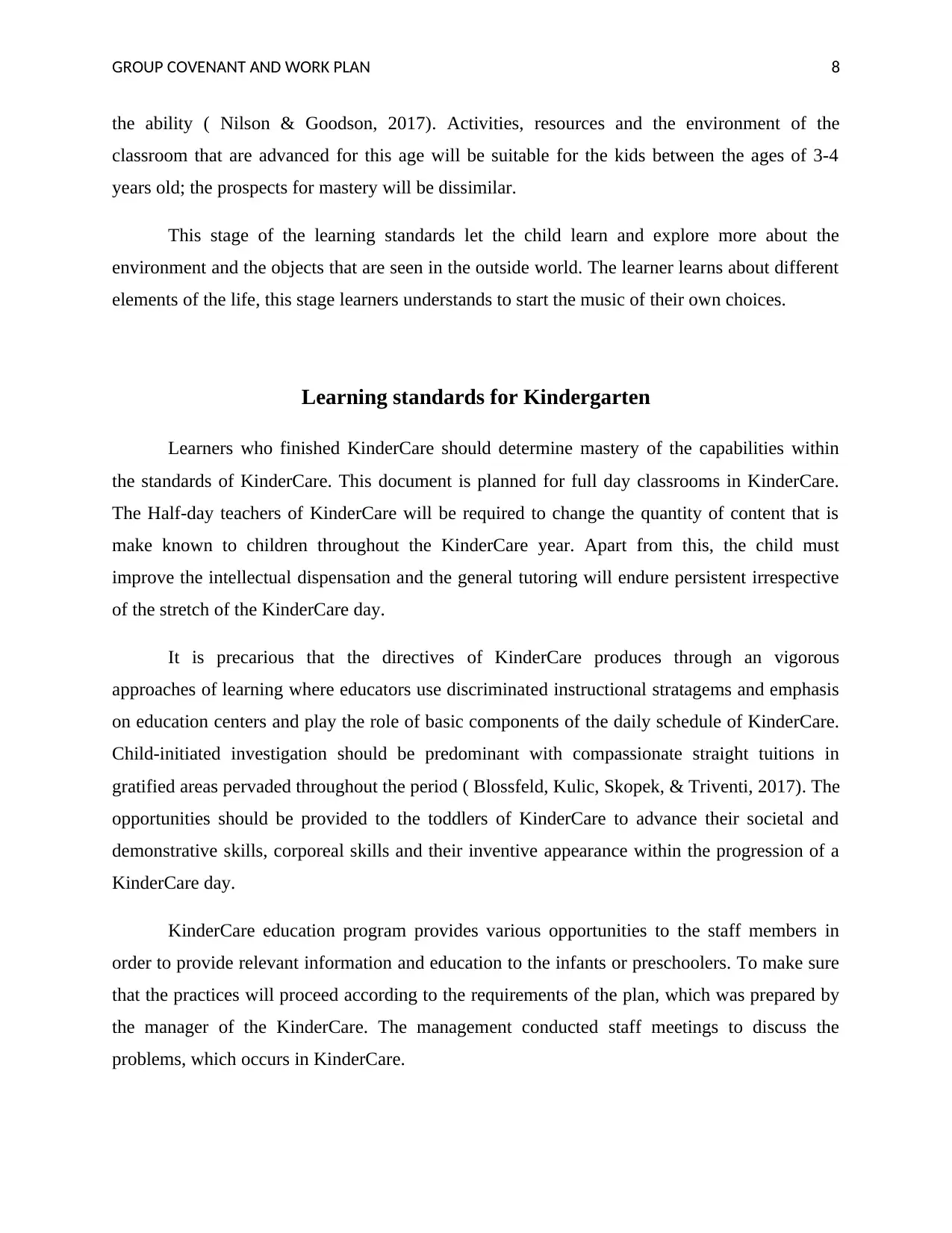
GROUP COVENANT AND WORK PLAN 8
the ability ( Nilson & Goodson, 2017). Activities, resources and the environment of the
classroom that are advanced for this age will be suitable for the kids between the ages of 3-4
years old; the prospects for mastery will be dissimilar.
This stage of the learning standards let the child learn and explore more about the
environment and the objects that are seen in the outside world. The learner learns about different
elements of the life, this stage learners understands to start the music of their own choices.
Learning standards for Kindergarten
Learners who finished KinderCare should determine mastery of the capabilities within
the standards of KinderCare. This document is planned for full day classrooms in KinderCare.
The Half-day teachers of KinderCare will be required to change the quantity of content that is
make known to children throughout the KinderCare year. Apart from this, the child must
improve the intellectual dispensation and the general tutoring will endure persistent irrespective
of the stretch of the KinderCare day.
It is precarious that the directives of KinderCare produces through an vigorous
approaches of learning where educators use discriminated instructional stratagems and emphasis
on education centers and play the role of basic components of the daily schedule of KinderCare.
Child-initiated investigation should be predominant with compassionate straight tuitions in
gratified areas pervaded throughout the period ( Blossfeld, Kulic, Skopek, & Triventi, 2017). The
opportunities should be provided to the toddlers of KinderCare to advance their societal and
demonstrative skills, corporeal skills and their inventive appearance within the progression of a
KinderCare day.
KinderCare education program provides various opportunities to the staff members in
order to provide relevant information and education to the infants or preschoolers. To make sure
that the practices will proceed according to the requirements of the plan, which was prepared by
the manager of the KinderCare. The management conducted staff meetings to discuss the
problems, which occurs in KinderCare.
the ability ( Nilson & Goodson, 2017). Activities, resources and the environment of the
classroom that are advanced for this age will be suitable for the kids between the ages of 3-4
years old; the prospects for mastery will be dissimilar.
This stage of the learning standards let the child learn and explore more about the
environment and the objects that are seen in the outside world. The learner learns about different
elements of the life, this stage learners understands to start the music of their own choices.
Learning standards for Kindergarten
Learners who finished KinderCare should determine mastery of the capabilities within
the standards of KinderCare. This document is planned for full day classrooms in KinderCare.
The Half-day teachers of KinderCare will be required to change the quantity of content that is
make known to children throughout the KinderCare year. Apart from this, the child must
improve the intellectual dispensation and the general tutoring will endure persistent irrespective
of the stretch of the KinderCare day.
It is precarious that the directives of KinderCare produces through an vigorous
approaches of learning where educators use discriminated instructional stratagems and emphasis
on education centers and play the role of basic components of the daily schedule of KinderCare.
Child-initiated investigation should be predominant with compassionate straight tuitions in
gratified areas pervaded throughout the period ( Blossfeld, Kulic, Skopek, & Triventi, 2017). The
opportunities should be provided to the toddlers of KinderCare to advance their societal and
demonstrative skills, corporeal skills and their inventive appearance within the progression of a
KinderCare day.
KinderCare education program provides various opportunities to the staff members in
order to provide relevant information and education to the infants or preschoolers. To make sure
that the practices will proceed according to the requirements of the plan, which was prepared by
the manager of the KinderCare. The management conducted staff meetings to discuss the
problems, which occurs in KinderCare.
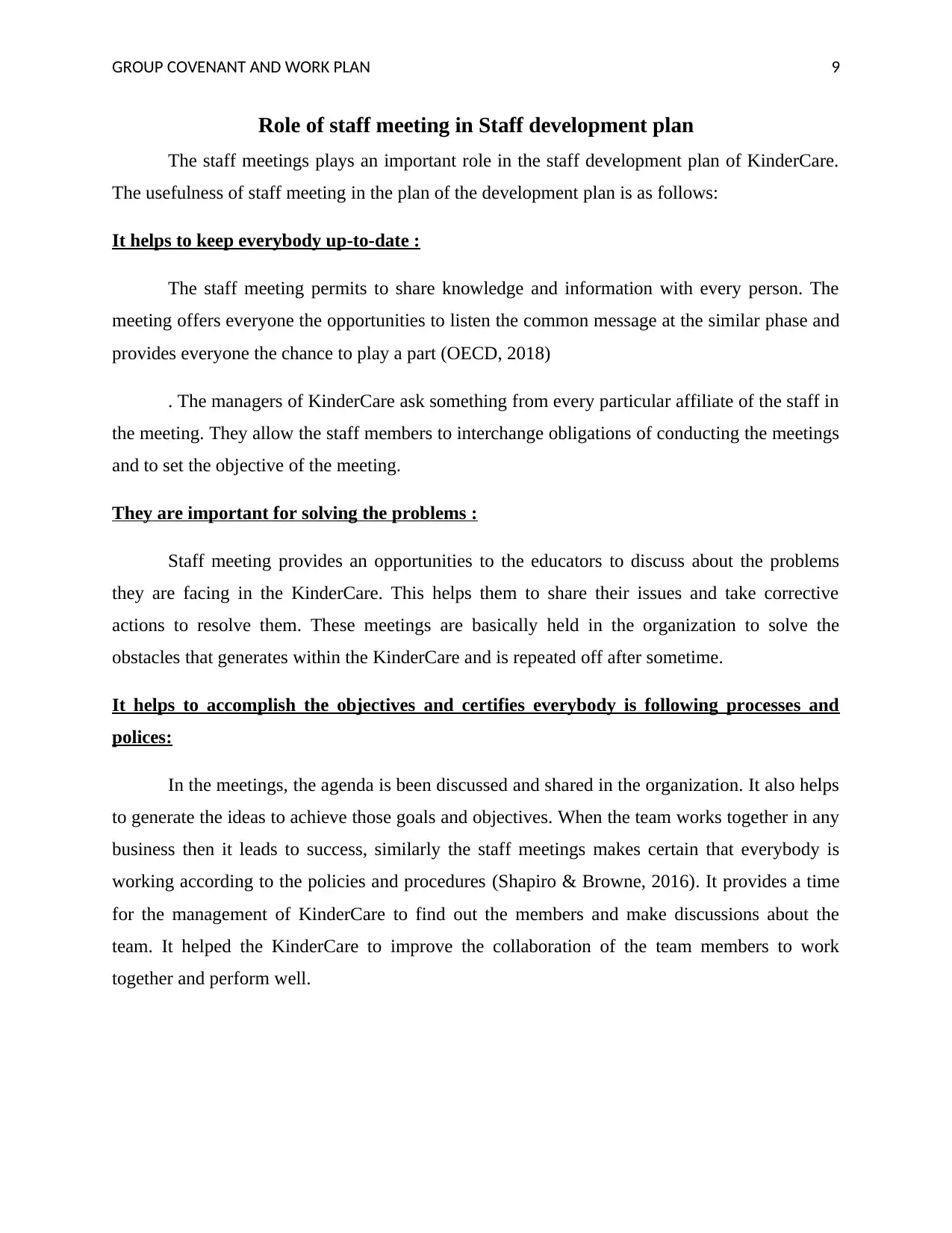
GROUP COVENANT AND WORK PLAN 9
Role of staff meeting in Staff development plan
The staff meetings plays an important role in the staff development plan of KinderCare.
The usefulness of staff meeting in the plan of the development plan is as follows:
It helps to keep everybody up-to-date :
The staff meeting permits to share knowledge and information with every person. The
meeting offers everyone the opportunities to listen the common message at the similar phase and
provides everyone the chance to play a part (OECD, 2018)
. The managers of KinderCare ask something from every particular affiliate of the staff in
the meeting. They allow the staff members to interchange obligations of conducting the meetings
and to set the objective of the meeting.
They are important for solving the problems :
Staff meeting provides an opportunities to the educators to discuss about the problems
they are facing in the KinderCare. This helps them to share their issues and take corrective
actions to resolve them. These meetings are basically held in the organization to solve the
obstacles that generates within the KinderCare and is repeated off after sometime.
It helps to accomplish the objectives and certifies everybody is following processes and
polices:
In the meetings, the agenda is been discussed and shared in the organization. It also helps
to generate the ideas to achieve those goals and objectives. When the team works together in any
business then it leads to success, similarly the staff meetings makes certain that everybody is
working according to the policies and procedures (Shapiro & Browne, 2016). It provides a time
for the management of KinderCare to find out the members and make discussions about the
team. It helped the KinderCare to improve the collaboration of the team members to work
together and perform well.
Role of staff meeting in Staff development plan
The staff meetings plays an important role in the staff development plan of KinderCare.
The usefulness of staff meeting in the plan of the development plan is as follows:
It helps to keep everybody up-to-date :
The staff meeting permits to share knowledge and information with every person. The
meeting offers everyone the opportunities to listen the common message at the similar phase and
provides everyone the chance to play a part (OECD, 2018)
. The managers of KinderCare ask something from every particular affiliate of the staff in
the meeting. They allow the staff members to interchange obligations of conducting the meetings
and to set the objective of the meeting.
They are important for solving the problems :
Staff meeting provides an opportunities to the educators to discuss about the problems
they are facing in the KinderCare. This helps them to share their issues and take corrective
actions to resolve them. These meetings are basically held in the organization to solve the
obstacles that generates within the KinderCare and is repeated off after sometime.
It helps to accomplish the objectives and certifies everybody is following processes and
polices:
In the meetings, the agenda is been discussed and shared in the organization. It also helps
to generate the ideas to achieve those goals and objectives. When the team works together in any
business then it leads to success, similarly the staff meetings makes certain that everybody is
working according to the policies and procedures (Shapiro & Browne, 2016). It provides a time
for the management of KinderCare to find out the members and make discussions about the
team. It helped the KinderCare to improve the collaboration of the team members to work
together and perform well.
⊘ This is a preview!⊘
Do you want full access?
Subscribe today to unlock all pages.

Trusted by 1+ million students worldwide
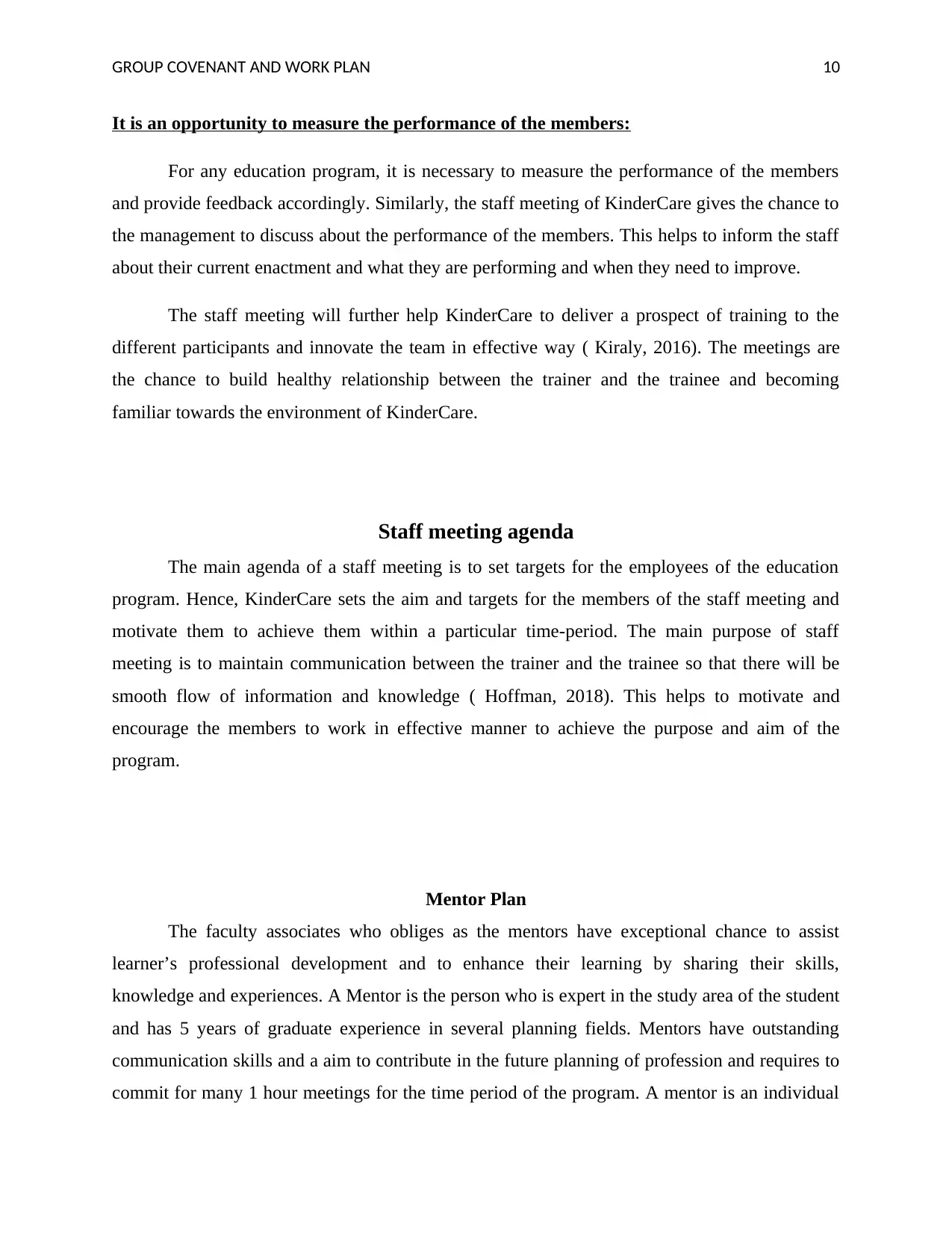
GROUP COVENANT AND WORK PLAN 10
It is an opportunity to measure the performance of the members:
For any education program, it is necessary to measure the performance of the members
and provide feedback accordingly. Similarly, the staff meeting of KinderCare gives the chance to
the management to discuss about the performance of the members. This helps to inform the staff
about their current enactment and what they are performing and when they need to improve.
The staff meeting will further help KinderCare to deliver a prospect of training to the
different participants and innovate the team in effective way ( Kiraly, 2016). The meetings are
the chance to build healthy relationship between the trainer and the trainee and becoming
familiar towards the environment of KinderCare.
Staff meeting agenda
The main agenda of a staff meeting is to set targets for the employees of the education
program. Hence, KinderCare sets the aim and targets for the members of the staff meeting and
motivate them to achieve them within a particular time-period. The main purpose of staff
meeting is to maintain communication between the trainer and the trainee so that there will be
smooth flow of information and knowledge ( Hoffman, 2018). This helps to motivate and
encourage the members to work in effective manner to achieve the purpose and aim of the
program.
Mentor Plan
The faculty associates who obliges as the mentors have exceptional chance to assist
learner’s professional development and to enhance their learning by sharing their skills,
knowledge and experiences. A Mentor is the person who is expert in the study area of the student
and has 5 years of graduate experience in several planning fields. Mentors have outstanding
communication skills and a aim to contribute in the future planning of profession and requires to
commit for many 1 hour meetings for the time period of the program. A mentor is an individual
It is an opportunity to measure the performance of the members:
For any education program, it is necessary to measure the performance of the members
and provide feedback accordingly. Similarly, the staff meeting of KinderCare gives the chance to
the management to discuss about the performance of the members. This helps to inform the staff
about their current enactment and what they are performing and when they need to improve.
The staff meeting will further help KinderCare to deliver a prospect of training to the
different participants and innovate the team in effective way ( Kiraly, 2016). The meetings are
the chance to build healthy relationship between the trainer and the trainee and becoming
familiar towards the environment of KinderCare.
Staff meeting agenda
The main agenda of a staff meeting is to set targets for the employees of the education
program. Hence, KinderCare sets the aim and targets for the members of the staff meeting and
motivate them to achieve them within a particular time-period. The main purpose of staff
meeting is to maintain communication between the trainer and the trainee so that there will be
smooth flow of information and knowledge ( Hoffman, 2018). This helps to motivate and
encourage the members to work in effective manner to achieve the purpose and aim of the
program.
Mentor Plan
The faculty associates who obliges as the mentors have exceptional chance to assist
learner’s professional development and to enhance their learning by sharing their skills,
knowledge and experiences. A Mentor is the person who is expert in the study area of the student
and has 5 years of graduate experience in several planning fields. Mentors have outstanding
communication skills and a aim to contribute in the future planning of profession and requires to
commit for many 1 hour meetings for the time period of the program. A mentor is an individual
Paraphrase This Document
Need a fresh take? Get an instant paraphrase of this document with our AI Paraphraser
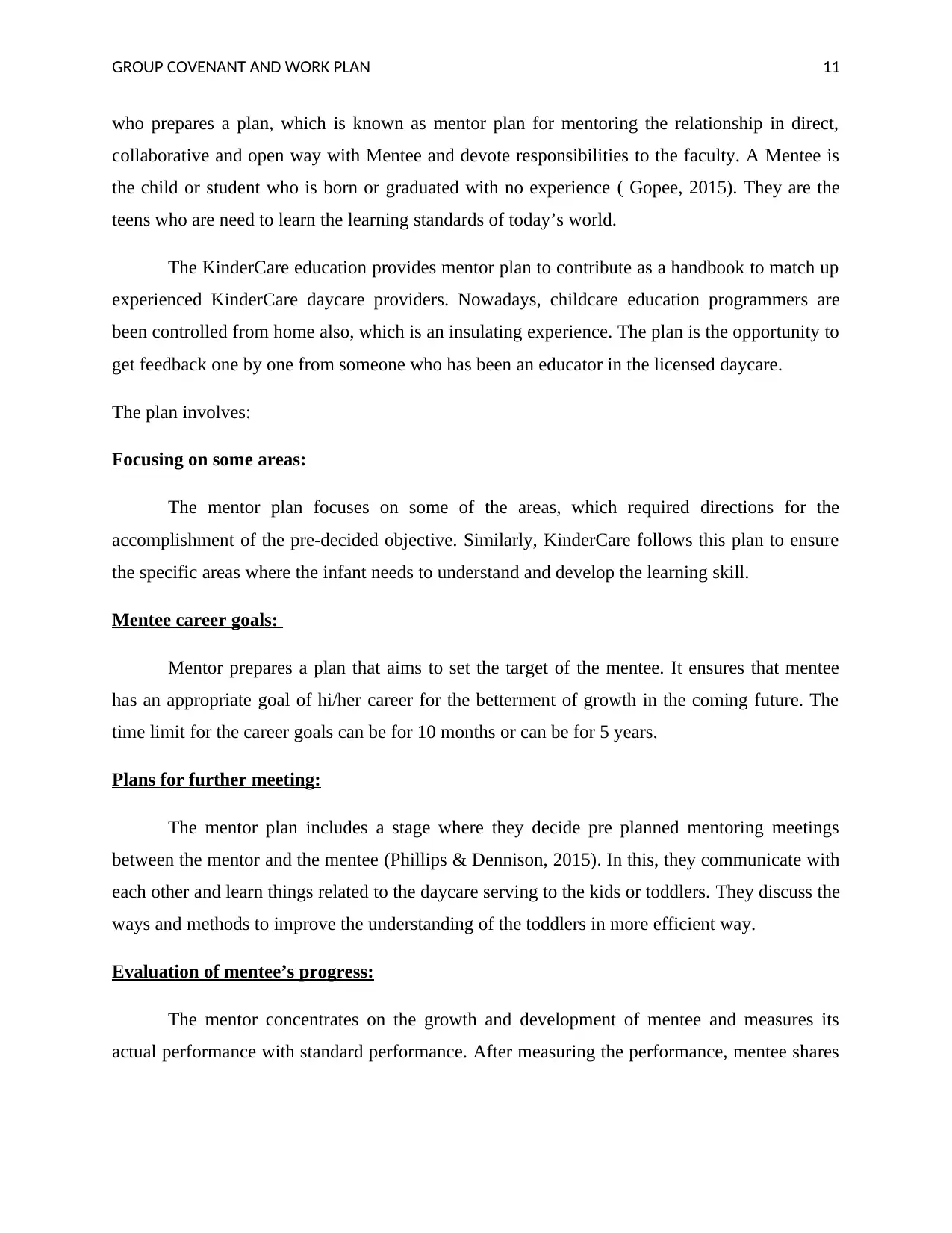
GROUP COVENANT AND WORK PLAN 11
who prepares a plan, which is known as mentor plan for mentoring the relationship in direct,
collaborative and open way with Mentee and devote responsibilities to the faculty. A Mentee is
the child or student who is born or graduated with no experience ( Gopee, 2015). They are the
teens who are need to learn the learning standards of today’s world.
The KinderCare education provides mentor plan to contribute as a handbook to match up
experienced KinderCare daycare providers. Nowadays, childcare education programmers are
been controlled from home also, which is an insulating experience. The plan is the opportunity to
get feedback one by one from someone who has been an educator in the licensed daycare.
The plan involves:
Focusing on some areas:
The mentor plan focuses on some of the areas, which required directions for the
accomplishment of the pre-decided objective. Similarly, KinderCare follows this plan to ensure
the specific areas where the infant needs to understand and develop the learning skill.
Mentee career goals:
Mentor prepares a plan that aims to set the target of the mentee. It ensures that mentee
has an appropriate goal of hi/her career for the betterment of growth in the coming future. The
time limit for the career goals can be for 10 months or can be for 5 years.
Plans for further meeting:
The mentor plan includes a stage where they decide pre planned mentoring meetings
between the mentor and the mentee (Phillips & Dennison, 2015). In this, they communicate with
each other and learn things related to the daycare serving to the kids or toddlers. They discuss the
ways and methods to improve the understanding of the toddlers in more efficient way.
Evaluation of mentee’s progress:
The mentor concentrates on the growth and development of mentee and measures its
actual performance with standard performance. After measuring the performance, mentee shares
who prepares a plan, which is known as mentor plan for mentoring the relationship in direct,
collaborative and open way with Mentee and devote responsibilities to the faculty. A Mentee is
the child or student who is born or graduated with no experience ( Gopee, 2015). They are the
teens who are need to learn the learning standards of today’s world.
The KinderCare education provides mentor plan to contribute as a handbook to match up
experienced KinderCare daycare providers. Nowadays, childcare education programmers are
been controlled from home also, which is an insulating experience. The plan is the opportunity to
get feedback one by one from someone who has been an educator in the licensed daycare.
The plan involves:
Focusing on some areas:
The mentor plan focuses on some of the areas, which required directions for the
accomplishment of the pre-decided objective. Similarly, KinderCare follows this plan to ensure
the specific areas where the infant needs to understand and develop the learning skill.
Mentee career goals:
Mentor prepares a plan that aims to set the target of the mentee. It ensures that mentee
has an appropriate goal of hi/her career for the betterment of growth in the coming future. The
time limit for the career goals can be for 10 months or can be for 5 years.
Plans for further meeting:
The mentor plan includes a stage where they decide pre planned mentoring meetings
between the mentor and the mentee (Phillips & Dennison, 2015). In this, they communicate with
each other and learn things related to the daycare serving to the kids or toddlers. They discuss the
ways and methods to improve the understanding of the toddlers in more efficient way.
Evaluation of mentee’s progress:
The mentor concentrates on the growth and development of mentee and measures its
actual performance with standard performance. After measuring the performance, mentee shares
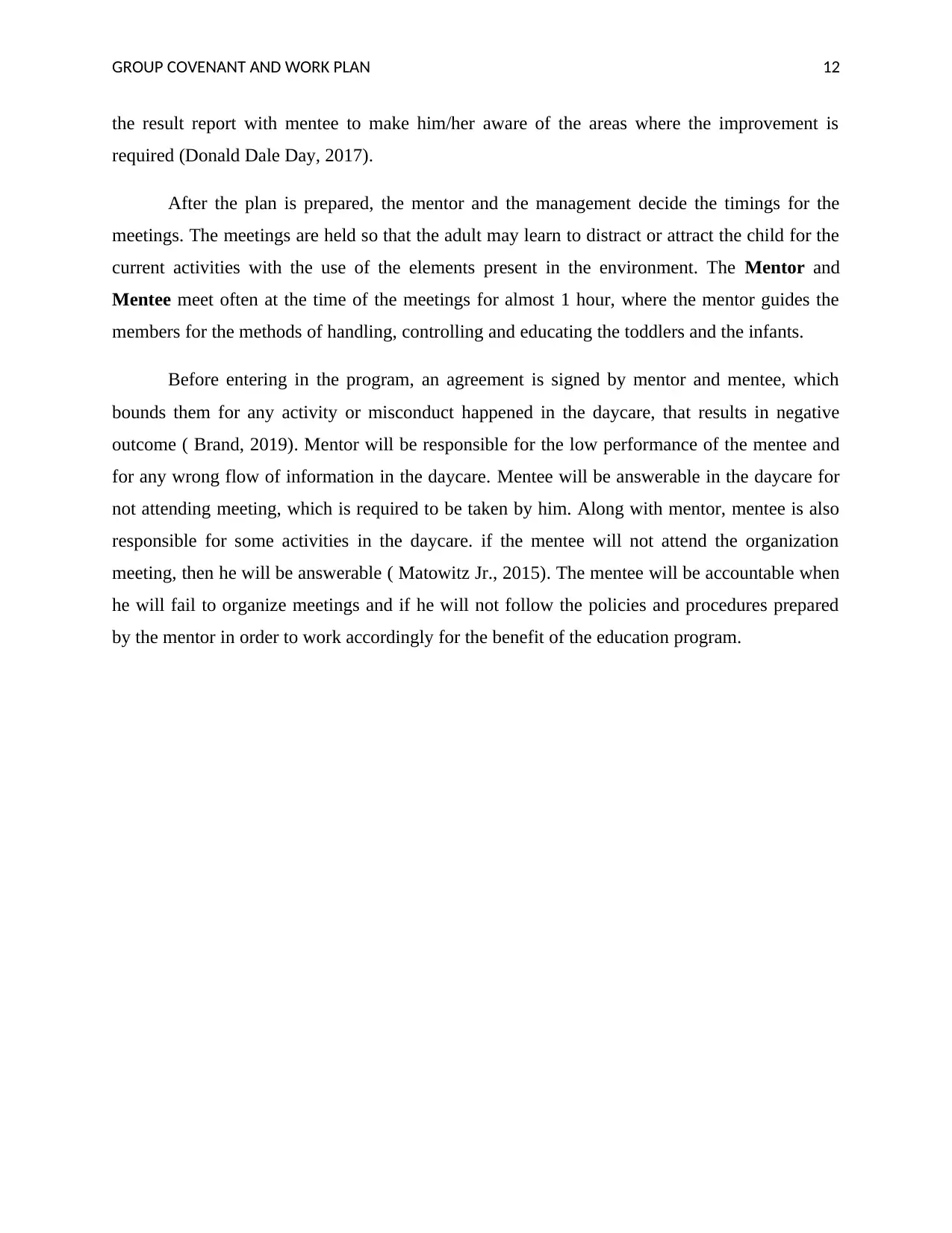
GROUP COVENANT AND WORK PLAN 12
the result report with mentee to make him/her aware of the areas where the improvement is
required (Donald Dale Day, 2017).
After the plan is prepared, the mentor and the management decide the timings for the
meetings. The meetings are held so that the adult may learn to distract or attract the child for the
current activities with the use of the elements present in the environment. The Mentor and
Mentee meet often at the time of the meetings for almost 1 hour, where the mentor guides the
members for the methods of handling, controlling and educating the toddlers and the infants.
Before entering in the program, an agreement is signed by mentor and mentee, which
bounds them for any activity or misconduct happened in the daycare, that results in negative
outcome ( Brand, 2019). Mentor will be responsible for the low performance of the mentee and
for any wrong flow of information in the daycare. Mentee will be answerable in the daycare for
not attending meeting, which is required to be taken by him. Along with mentor, mentee is also
responsible for some activities in the daycare. if the mentee will not attend the organization
meeting, then he will be answerable ( Matowitz Jr., 2015). The mentee will be accountable when
he will fail to organize meetings and if he will not follow the policies and procedures prepared
by the mentor in order to work accordingly for the benefit of the education program.
the result report with mentee to make him/her aware of the areas where the improvement is
required (Donald Dale Day, 2017).
After the plan is prepared, the mentor and the management decide the timings for the
meetings. The meetings are held so that the adult may learn to distract or attract the child for the
current activities with the use of the elements present in the environment. The Mentor and
Mentee meet often at the time of the meetings for almost 1 hour, where the mentor guides the
members for the methods of handling, controlling and educating the toddlers and the infants.
Before entering in the program, an agreement is signed by mentor and mentee, which
bounds them for any activity or misconduct happened in the daycare, that results in negative
outcome ( Brand, 2019). Mentor will be responsible for the low performance of the mentee and
for any wrong flow of information in the daycare. Mentee will be answerable in the daycare for
not attending meeting, which is required to be taken by him. Along with mentor, mentee is also
responsible for some activities in the daycare. if the mentee will not attend the organization
meeting, then he will be answerable ( Matowitz Jr., 2015). The mentee will be accountable when
he will fail to organize meetings and if he will not follow the policies and procedures prepared
by the mentor in order to work accordingly for the benefit of the education program.
⊘ This is a preview!⊘
Do you want full access?
Subscribe today to unlock all pages.

Trusted by 1+ million students worldwide
1 out of 15
Related Documents
Your All-in-One AI-Powered Toolkit for Academic Success.
+13062052269
info@desklib.com
Available 24*7 on WhatsApp / Email
![[object Object]](/_next/static/media/star-bottom.7253800d.svg)
Unlock your academic potential
Copyright © 2020–2026 A2Z Services. All Rights Reserved. Developed and managed by ZUCOL.





